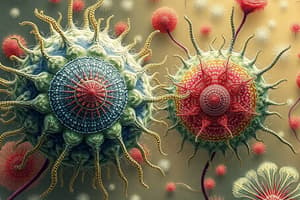Podcast
Questions and Answers
What is the primary function of ribosomes in a eukaryotic cell?
What is the primary function of ribosomes in a eukaryotic cell?
- Protein synthesis (correct)
- Polysaccharide metabolism
- Energy production
- Lipid synthesis
Which organelle is responsible for packaging secretory products in a eukaryotic cell?
Which organelle is responsible for packaging secretory products in a eukaryotic cell?
- Golgi apparatus (correct)
- Nucleus
- Mitochondria
- Endoplasmic reticulum
What is the function of the cell cytoskeleton?
What is the function of the cell cytoskeleton?
- Synthesizing proteins
- Providing shape and structure to the cell (correct)
- Storing genetic information
- Stabilizing ribosomal structure
Which component stabilizes the ribosomal structure?
Which component stabilizes the ribosomal structure?
What role does the endoplasmic reticulum play in the cell?
What role does the endoplasmic reticulum play in the cell?
Which of the following is NOT a function of the Golgi apparatus?
Which of the following is NOT a function of the Golgi apparatus?
What is the significance of cellular trafficking?
What is the significance of cellular trafficking?
What type of cell is characterized by a defined nucleus and membrane-bound organelles?
What type of cell is characterized by a defined nucleus and membrane-bound organelles?
What is a primary function of the Rough Endoplasmic Reticulum (RER)?
What is a primary function of the Rough Endoplasmic Reticulum (RER)?
Which of the following is a function of Smooth Endoplasmic Reticulum (SER)?
Which of the following is a function of Smooth Endoplasmic Reticulum (SER)?
Which organelle is primarily known as the 'powerhouse of the cell'?
Which organelle is primarily known as the 'powerhouse of the cell'?
What type of enzymes are contained in lysosomes?
What type of enzymes are contained in lysosomes?
How do mitochondria reproduce?
How do mitochondria reproduce?
What is the pH of lysosomes?
What is the pH of lysosomes?
Which of the following statements about mitochondrial DNA is true?
Which of the following statements about mitochondrial DNA is true?
What role do peroxisomes play in the cell?
What role do peroxisomes play in the cell?
Flashcards are hidden until you start studying
Study Notes
Cell Biology
- Cell biology is also known as cytology
- Dr. Katja Vogt is a researcher in cell biology
- She is affiliated with the School of Medicine at University of Central Lancashire
Cell Structure and Function
- Key Learning Objectives:
- Describe the components of the cell
- Explain the structure and function of major cell organelles
- Discuss the cell cytoskeleton
- Highlight the importance of cellular trafficking
The Eukaryotic Cell
- The eukaryotic cell has many components:
- Cell membrane
- Nucleus
- Ribosome
- Endoplasmic reticulum (ER)
- Golgi apparatus
- Centriole
- Mitochondria
Ribosomes
- Ribosomes are comprised of two subunits:
- Large (60S)
- Small (40S)
- Include ribosomal RNA (rRNA) to stabilise ribosomal structure
- Produced and assembled in the nucleolus
- Function: protein synthesis
Golgi Apparatus
- The Golgi apparatus is responsible for:
- Polysaccharide synthesis
- Modifying secretory products
- Sorting secretory products
- Packaging secretory products
- Concentrating and storing secretory products
Endoplasmic Reticulum (ER)
- The ER is responsible for synthesising, packing, and processing various molecules
- There are two forms of ER:
- Rough ER (RER)
- Smooth ER (SER)
Rough ER (RER)
- The RER is responsible for:
- Protein synthesis sequestered from the cytoplasm
- Secretory proteins
- Integral membrane proteins
- Lysosomal enzymes
- Function: Core glycosylation
Smooth ER (SER)
- The SER is responsible for:
- Lipid metabolism
- Steroid hormone synthesis
- Gluconeogenesis
- Detoxification
Vesicles
-
Vesicles are compartments carrying various substances within the cell
-
Three types of vesicles:
- Granules
- Lysosomes
- Peroxisomes
Granules
- Granules are vesicles destined for exocytosis
- Abundant in specialised secretory cells
Lysosomes
- Lysosomes have a pH of 5
- Contain hydrolytic enzymes
- Function: Degradation of material
Peroxisomes
- Peroxisomes participate in hydrogen peroxide metabolism
- Assist in fatty acid oxidation
Mitochondria
- Mitochondria are known as the power-house of the cell
- Function: Synthesise their own DNA and some proteins
- Mitochondria grow and reproduce
- Can move rapidly and change shape
Mitochondria - Structure
- Mitochondria have a prokaryote relic
- Contain their own DNA (mtDNA), which is maternally inherited
- Has two membranes:
- Outer membrane - permeable to molecules
- Inner membrane - folded into cristae
Studying That Suits You
Use AI to generate personalized quizzes and flashcards to suit your learning preferences.




